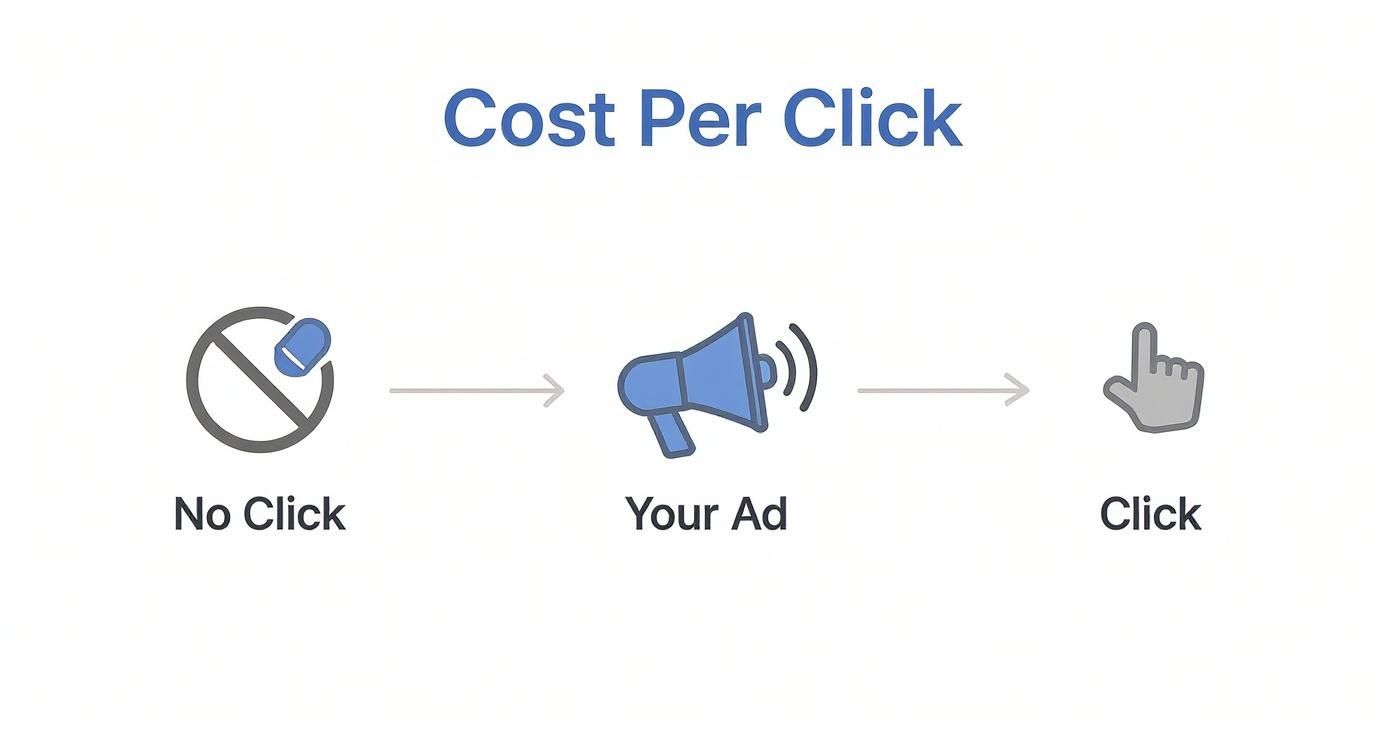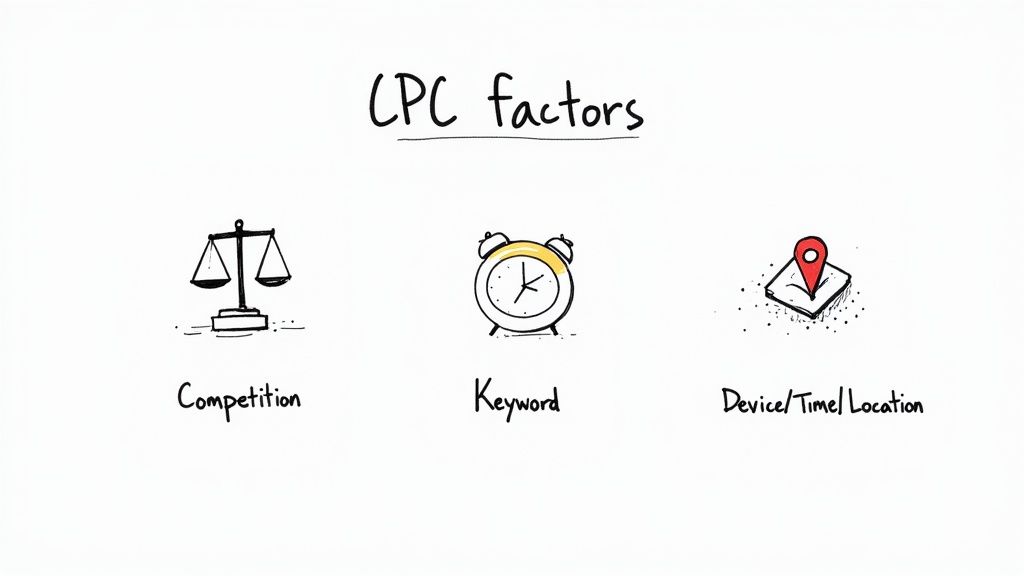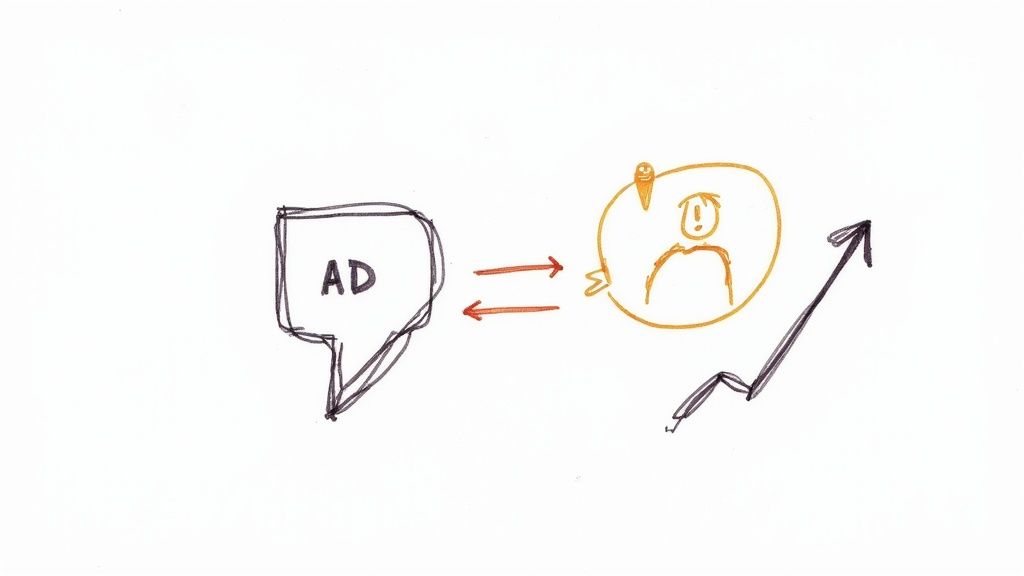What Is Cost Per Click? A Simple Guide for Okanagan Businesses
Cost Per Click, or CPC as it’s usually called, is an advertising model where you only pay a small fee when someone actually clicks on your ad. It’s a pretty simple idea. Instead of paying for your ad to just be seen, you’re paying when someone shows real interest.
Understanding Cost Per Click in Simple Terms
You’ve probably heard ‘Cost Per Click’ or ‘CPC’ tossed around in marketing chats. It sounds a bit technical, but the core idea is surprisingly simple.
Let’s say you’re promoting your Kelowna shop by handing out flyers downtown. You pay to print every single flyer, whether people read them or just toss them in the bin. But what if you only had to pay when someone took your flyer, walked straight into your shop, and said, "This caught my eye"?
That’s the essence of CPC.
With CPC, your marketing budget is spent directly on people who are already curious about what you offer. You’re paying for a direct response.
This makes it a really effective tool for Okanagan business owners who need their marketing dollars to work as hard as they do. You're not just throwing money at ads and hoping for the best; you're investing in real interactions. Each click represents a real person taking a step toward your business.
Why It Matters for Your Business
As a small business owner, every penny in your marketing budget has a job to do. I get it. CPC advertising helps you make that spending count by tying it directly to actions.
Here’s what that really means for you:
-
You're in control: You decide the maximum amount you’re willing to pay for a single click. This gives you direct control over your ad spend. No nasty surprises.
-
It’s measurable: You can track exactly how many people clicked your ad. This gives you clear insight into what’s working with your audience and what needs a rethink.
-
You reach interested people: Clicks usually come from people who are actively searching for products or services just like yours. So you’re connecting with a much warmer, more engaged audience right from the start.
Getting a handle on all the related jargon can feel a bit overwhelming at first. To help you navigate the language of digital ads, we've put together a handy Google AdWords glossary of terms that's a great place to start.
How Your Actual Cost Per Click Is Decided
So, you only pay when someone clicks… but how much does that click actually cost? It’s not like checking a price tag at the store. Every single time someone in the Okanagan searches for your services, a lightning-fast auction takes place behind the scenes to decide whose ad gets shown, and where.
The price you end up paying isn’t just about who has the deepest pockets. Think of it like trying to get the best table at a popular Kelowna restaurant on a busy Friday night. It’s not just about who offers the most money; the host also cares about who will be the best patron for the restaurant's vibe.
In the ad auction, your actual cost is determined by two key things:
-
Your Bid: This is the absolute maximum you're willing to pay for a single click on your ad. You get to set this limit yourself.
-
Your Quality Score: This is a rating from 1 to 10 that Google assigns your ad. It’s a measure of how relevant and helpful it thinks your ad, keywords, and landing page are to the person searching.
This simple breakdown shows how an ad goes from an impression (being seen) to a valuable click.

The key takeaway from the visual is that you only open your wallet when that click actually happens, turning a curious searcher into a real visitor on your website.
Why Quality Score Is Your Secret Weapon
Here's where things get interesting. A high Quality Score can actually help you win a better ad position for less money. Yep—a lower cost.
If Google’s system sees your ad as highly relevant and your landing page as genuinely useful, it rewards you with a lower cost per click. A well-crafted ad for a Vernon plumber with an excellent Quality Score might actually pay less per click than a competitor, even if that competitor placed a higher bid.
A better ad experience for the user often means a lower cost for you. Google’s main goal is to show its users the best possible results, and it rewards advertisers who help them do that.
Small improvements to your ad copy and landing page can make a huge difference. Using features like ad extensions can also boost your ad's relevance and encourage more people to click. To get a better handle on these, check out our simple guide to Google Ad Extensions.
Of course, the cost can also vary wildly depending on your industry. In highly competitive markets, the average cost per click for legal services can hover around $8.58, while a field like real estate might be closer to $2.53.
Key Factors That Influence Your Ad Costs
Ever wondered why a click for a Penticton lawyer costs way more than one for a local bakery? It’s a great question. The price you pay for a click isn’t random; several key factors are always at play, pushing the cost up or down.
Getting a handle on these levers is the first step to taking real control of your ad budget. It’s about making smart, strategic decisions instead of just crossing your fingers and hoping for the best.

What Impacts Your CPC
Here’s a look at the common factors that can raise or lower your average Cost Per Click. Think of them as dials you can adjust to fine-tune your campaign performance.
| Factor | How It Can Lower Your CPC | How It Can Raise Your CPC |
|---|---|---|
| Competition | Bidding in a less crowded niche or targeting a unique audience. | Competing in a saturated market like finance or legal services. |
| Keyword Selection | Using specific, long-tail keywords (e.g., "waterproof hiking boots for women"). | Bidding on broad, general keywords (e.g., "shoes"). |
| Ad Relevance | Writing compelling, highly relevant ad copy that matches user intent. | Using generic ad copy that doesn't align with your keywords. |
| Targeting | Narrowing your audience by location, device, or time of day to reach the most valuable users. | Targeting a very broad demographic or geographic area. |
Each of these elements interacts with the others, so mastering them together is where the real magic happens in controlling your ad spend.
Competition and Industry
Some industries are simply more crowded. Think about fields like finance or legal services—the competition is fierce, and the value of a single new client is incredibly high. Naturally, advertisers in these sectors are willing to bid more for a click, which drives up the average cost for everyone involved.
For example, the average CPC for a financial keyword can be as high as $3.77. In contrast, clicks for industries like apparel or travel often land at less than a dollar. It really all comes down to how many other businesses are vying for the same eyeballs.
Your Keyword Selection
This one is huge. The keywords you target have a direct and immediate impact on what you'll pay per click.
Broad, general terms like "shoes" are almost always more expensive because they’re so competitive. You’re bidding against every shoe retailer out there.
A simple shift in your keyword strategy can make a massive difference. Specific, long-tail phrases act like a secret handshake with your ideal customer, telling them you have exactly what they need.
Instead of just "shoes," get more specific. A long-tail phrase like "women's hiking boots for sale in Kelowna" is far more targeted. It will almost certainly have a lower CPC while attracting a much more qualified buyer who is close to making a purchase. It’s all about perfectly matching what someone is searching for with an ad that feels like the perfect answer. Learning how to write click-worthy ad copy is a key piece of this puzzle.
Other Important Factors
Beyond industry competition and keywords, a few other elements can quietly influence your ad costs:
-
Time of Day: Clicks can be more expensive during peak business hours when more of your target audience is online and searching.
-
Device: Sometimes a click from a desktop computer will cost more (or less) than one from a smartphone, all depending on user behaviour in your specific industry.
-
Location: Targeting a specific neighbourhood in West Kelowna will likely have a different cost profile than targeting the entire Okanagan Valley.
Why a Low CPC Isn't Always the Goal
It's a common instinct to chase the lowest Cost Per Click you can find. I get it. When you're running a business, every dollar has a job to do. But I'm going to let you in on a little secret we've learned after years in the trenches: the cheapest click is rarely the best click.
Think about it this way: sometimes, paying a bit more for a click is actually the smarter play. A cheap click might just be a window shopper with no real plan to buy. A valuable click comes from someone who is actively looking to book your service or buy your product… right now.
This is where you shift your thinking from just cutting costs to making smart investments. The goal is to get a better return. In fact, many successful small and medium-sized businesses aim for a $2 return for every $1 they spend on their campaigns. That really highlights how the focus is on profitability, not just pinching pennies upfront.
A Quick West Kelowna Story
Let me tell you about a great client we worked with over in West Kelowna. They were completely fixated on getting the lowest CPC possible. And on paper, they were succeeding—their CPC was rock-bottom. The only problem? The phone wasn't ringing, and sales were flat.
Chasing the lowest CPC can sometimes mean you're attracting an audience that isn't ready to buy. A slightly higher CPC might connect you with fewer people, but they're the right people.
We sat down and took a hard look at their strategy. We decided to pivot and reallocate their budget towards a more specific—and yes, slightly more expensive—audience. We targeted people who were clearly searching for high-quality solutions and were ready to make a decision.
What happened next was a game-changer. Their CPC ticked up slightly, but their sales absolutely took off. Sure, they got fewer total clicks, but the ones they did get were from genuine, ready-to-buy customers. It’s the perfect real-world example of how investing a little more in the right click can pay off big time. If you feel like you're stuck in that same boat, sometimes a fresh pair of eyes is all it takes. A quick chat can often uncover what’s working and what isn’t, and you can always get in touch with us to start that conversation.
Practical Tips to Improve Your CPC
Alright, enough with the theory. Let's get practical and talk about what you can actually do to lower your costs and get more bang for your advertising buck.
You don't need a massive budget or a marketing degree to make a real difference. It’s all about turning this knowledge into a smart strategy that brings more customers through your door.

Write Ad Copy That Connects
Think of your ad as the first handshake with a potential customer. It needs to make a good impression, fast. Instead of just listing what you do, speak directly to the problem your customer is trying to solve.
-
Be Specific: A generic "Plumber in Kelowna" is okay, but "Fast 24/7 Emergency Plumbing in Kelowna" is far more compelling for someone with a burst pipe.
-
Highlight Benefits: Don't just say "We sell boots." Instead, try "Stay Dry on Your Hike. Waterproof Boots in Stock." You're selling the solution, not just the product.
Put yourself in your ideal Okanagan customer's shoes. What are they searching for? Write your ad as if you're answering that exact question. This simple shift can make a world of difference.
Create Simple Landing Pages
So, they've clicked your ad. Great! But where do they land? Your landing page has one critical job: to make it incredibly easy for that person to take the next step.
Your landing page should be a clear, simple continuation of the promise you made in your ad. If your ad mentions a specific service, that service should be front and centre on the page.
Avoid cluttering the page with a dozen different options. If your goal is to have them book a consultation, make the "Book Your Free Consultation" button big, obvious, and impossible to miss. Remove any distractions that could get in the way of that one, single goal.
Use Smarter Targeting
You don't need to show your ads to everyone. In fact, you shouldn't. Smart targeting lets you zero in on the people who are actively looking for what you offer, right here in Vernon or Penticton. You can focus your ads based on location, time of day, and even the type of device someone is using.
Getting in front of the right audience naturally improves your ad's performance. It’s also worth knowing that costs can vary a lot between platforms. For instance, Facebook Ads often have a much lower average CPC, around $1.35, which can make them a fantastic choice for reaching specific local audiences.
If setting all this up feels a bit overwhelming, that’s perfectly normal. Getting an expert involved can make sure your budget is working as hard as it possibly can. The right partner can turn these tips into a winning strategy, and we're always here to help you take that next step with confidence.
Common Questions We Hear About Cost Per Click
We get asked about CPC all the time by local business owners, which is great. It means you’re thinking carefully about where your marketing dollars are going. Let's tackle a few of the most common questions we hear.
How Much Should I Budget to Start?
There's no one-size-fits-all answer here, and anyone who gives you a magic number probably isn't telling you the whole story. Your starting budget really comes down to your industry, your goals, and your comfort level.
A smart approach is to work backwards from what a new customer is worth to you. From there, we typically suggest setting a modest monthly budget to test the waters. This lets you dip your toes in, collect some real data on your Okanagan audience, and see what's actually connecting before you decide to go all-in.
So, What's a Good Cost Per Click?
This is the million-dollar question, isn't it? The simple truth is that a "good" CPC is whatever is profitable for your business. It’s completely relative.
Think of it this way: a home renovation company might happily pay $15 for a single click if that click turns into a $15,000 project. On the other hand, if you're selling a small product online, that $15 click would be a disaster.
Your focus should be on finding the sweet spot where your ad spend is generating more revenue than it costs.
Can I Just Run My Own Google Ads Campaigns?
You certainly can. The platforms are designed to be self-serve. That said, there's a steep learning curve between simply running a campaign and running one that actually makes you money.
Many business owners start by managing their own ads. They often find that as their business grows, their time becomes too valuable to spend wrestling with ad platforms. That's usually when they decide to partner with an agency to get better results without the daily headache.
At Navigator Multimedia, our job is to make sense of the numbers so you can focus on what you do best. If you’re ready to turn clicks into real customers, let's connect and see how we can help.



